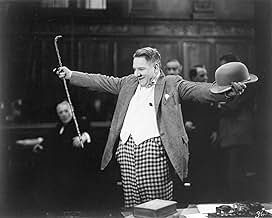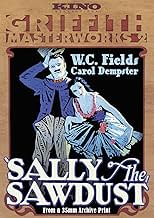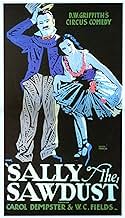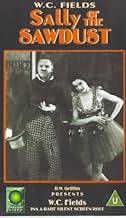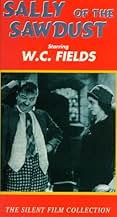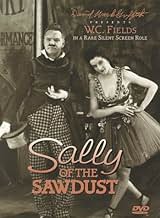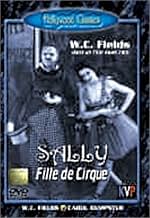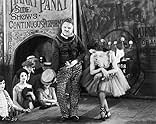Aggiungi una trama nella tua linguaJudge Foster throws his daughter out because she married a circus man. She leaves her baby girl with Prof. McGargle before she dies. Years later Sally is a dancer with whom Peyton, a son of ... Leggi tuttoJudge Foster throws his daughter out because she married a circus man. She leaves her baby girl with Prof. McGargle before she dies. Years later Sally is a dancer with whom Peyton, a son of Judge Foster's friend, falls in love. When Sally is arrested McGargle proves her real pare... Leggi tuttoJudge Foster throws his daughter out because she married a circus man. She leaves her baby girl with Prof. McGargle before she dies. Years later Sally is a dancer with whom Peyton, a son of Judge Foster's friend, falls in love. When Sally is arrested McGargle proves her real parentage.
- Regia
- Sceneggiatura
- Star
- Premi
- 3 vittorie totali
- Leon - the Acrobat
- (as Glen Anders)
- Stooge
- (non citato nei titoli originali)
- Bandit
- (non citato nei titoli originali)
- Bit Role
- (non citato nei titoli originali)
- Yokel in the Old Army Game
- (non citato nei titoli originali)
Recensioni in evidenza
This is not, of course, D. W. Griffith's masterpiece, but it does showcase his film-making savvy in full maturity. He uses all his innovations, which are techniques we take for granted now: close- ups, cross-cutting, a mobile camera, and the ability to modify acting from theatrical exaggeration to cinematic subtlety.
W. C. Fields also showcases his skills-- not his signature gruff delivery, but his remarkable dexterity as a physical comedian. He does a few inventive juggling acts, cut too short to be fully appreciated, and some very deft pickpocketing, but it seems that every prop that comes within reach gets manipulated for comic effect-- hat, cane, car roof, dog, cash. He's a joy to behold.
Much has been said against Carol Dempster as an actress, but not by me. She was 22 at the time, playing a teenager, and her combination of grace and awkwardness is engaging, particularly when she dances. She's not a beauty-- though she's positively luminous in the scene where she's gussied up like a Talmadge sister-- but her plainness enhances her simple affection for Fields, her guardian.
Finally, there is Alfred Lunt in one of his rare film roles, as a dashing leading man. He and his British wife Lynne Fontane (a lavender marriage) made one talkie together-- a wonderfully funny one, "The Guardsman," in 1931-- after which they quit movies forever for the Broadway stage, where they reigned from 1923 to 1957. So famous and powerful were they that they would only accept theatrical contracts which allowed them to work together. As for movies, Fontanne wrote to the Hollywood producer who tried to lure them back with huge flippin' wadges of cash, "We can be bought, but we cannot be bored."
The picture sees him teamed up with pioneer director D.W. Griffith, now sadly long past his glory days. Griffith was never really much of a comedy director. He doesn't seem to have the confidence in his performers to let them do their stuff and allow the scenes to play out. Instead he seems stuck in the Keystone Cops mode of slapstick, which is always very frenetic, with lots of cuts. In a way this works out well because Griffith could at least direct a good action sequence, and scenes like the punch-up at the circus even if not very funny are at least nicely timed and escalated. Besides, even if the comedy fails the general air of irreverence stops the picture from getting too mawkish.
It is also rather nice to see Griffith returning to a simple, human story, as his usual epics with ride-to-the-rescue finales had been getting a little stale of late. Sally of the Sawdust more than any other harks back to the short films he made in the early teens for the way he focuses on individuals rather than wider social processes. There are some good examples of the way he builds up an emotional story. In the prologue, when the daughter is kicked out, we see the mother and father turn away from each other to face opposite walls, the camera well back in the large space, a perfect evocation of this cold, fractured household. And Griffith is still so good at expressing a feeling with the most delicate of close-ups, showing us for example Carol Dempster's hand clutching at the grass as she canoodles with Alfred Lunt. Acting performances vary immensely across Griffith's body of work, but the relatively restrained turns from Dempster and Elfie Shannon as old Mrs Foster add immensely to the poignant final scenes.
But what of W.C. Fields himself? We here and there see him going off into some bit of comedy business, but the truth is as a slapstick comic he is nothing really exceptional. He doesn't have the energy or flexibility to keep up with the wilder slapstick, and sequences like the one where he keeps knocking off his own hat just look out of place. Of course there is a lot more for him to do in Sally of the Sawdust, and Fields is at his funniest when simply acting out bits of the play (presumably kept intact from the original stage version) in his own characteristic manner. When trying to evade the police, he emerges from his hiding place wrapped in a cloak disguised as an Indian, and it is the way he strolls towards the camera, nonchalantly puffing on a cigar, that makes the moment funny. Still, there is clearly something missing from the act – the delivery, the voice, not to mention the opportunity to develop a curmudgeonly character without having to occasionally play the clown. It is no wonder his screen career never really took off until the arrival of the talkies.
Before Sally is born her well bred and off mother decides to run off with a show person against parents wishes and is disowned. With the father dead and the mother dying Poppy (Fields) agrees to return the child to her parents but then he decides to raise her himself. Together they tour and perform into her adulthood when the day of reckoning approaches, further complicated by Sally's romance with a swell and member of her grandparents polite society who disdain show people.
Directed by D.W. Griffith in the latter half of his career, Sally has a dated look for a 25 silent with many scenes hearkening back to his halcyon period a decade earlier as his famous montage style looks more like a Mack Sennett Keystone short in spots. Once again he focuses on societal hypocrisy and intolerance but it comes across hackneyed. Silent film had moved into its golden era and Griffith remained inert while Vidor, DeMille and Ingram were taking form and content to another level.
Fields is both funny and touching as he protects Sally and tries to make a living in a variety of dubious enterprises. Dempster is remarkably agile as she takes her licks in more than one scene as well as have a chameleon like look that goes from homely tomboy to deco sleek vamp. It is the energy and talent of both that carry Sally as they leave D.W. anachronistic style in the dust.
The breathtaking beauty of earlier D.W. Griffith-directed films is noticeably absent. While some of the shots are lovely, nothing equals the artfulness evident throughout many past Griffith efforts. "Sally of the Sawdust" is beautifully preserved (if only all Griffith prints were as well preserved); and, it is an enjoyable comedy (certainly more so in 1925). It was adapted from Dorothy Donnelly's popular play "Poppy" (1923), with Madge Kennedy and W.C. Fields. It was re-filmed as "Poppy" (1936), with Rochelle Hudson and W.C. Fields. Norma Talmadge's popular film was an altogether different "Poppy" (1917), and did not co-star W.C. Fields.
***** Sally of the Sawdust (8/2/25) D.W. Griffith ~ Carol Dempster, W.C. Fields, Alfred Lunt
I did enjoy this film. I thought Carol Dempster was good in her role, but of course I was more interested in the times when Fields is on screen. There are some specific moments for Fields fans to savour. The fleeting shots of his juggling skills, the first evidence of the subtle reactions and gestures that we know from his classic talkies of the 1930's, and the peanut cart disguise for a liquor cabinet that survives from his Zeigfield Follies days.
This won't be a movie I turn to as often as I do to the great W.C. Fields films of 1932-34, but I'm just so glad that it has not been lost to us as have been other of Fields silent film work.
Lo sapevi?
- QuizD.W. Griffith had good reason not to use the name or title "Poppy" for this movie -a movie titled "Poppy" with a character by that name had come out in 1917.
- BlooperWhen Sally and Eustache were lying on the railway, after get wet on the train, you can clearly see that the railway ends on the film studio wall, right behind them.
- ConnessioniFeatured in W.C. Fields: Straight Up (1986)
I più visti
Dettagli
Botteghino
- Lordo Stati Uniti e Canada
- 304.081 USD
- Tempo di esecuzione1 ora 44 minuti
- Mix di suoni
- Proporzioni
- 1.33 : 1
Contribuisci a questa pagina


